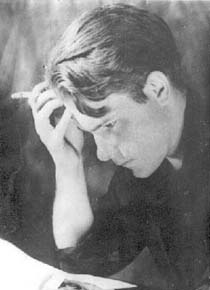Lawrence Durrell (February 27, 1912 - November 7, 1990)

Although a heterosexual, Lawrence Durrell created in his novels a sophisticated literary world in which both male and female homosexuality are significant and recognized presences.
Durrell was born on February 27, 1912, in Julundar, India, of an Irish mother and a British civil-engineer father. He attended the College of St. Joseph, Darjeeling, India, and St. Edmund's School, Canterbury, England. He chose not to qualify for Oxford or Cambridge.
In 1935, the family moved to Corfu, Greece. From there, Durrell regularly visited London and Paris, where he met Henry Miller in 1937 after a two-year correspondence. Miller introduced him to T. S. Eliot; and while he was in Paris in 1937 and 1938, Durrell, Miller, and Alfred Perlès formed an avant-garde literary magazine entitled Booster (renamed Delta in April 1938).
Durrell's early life is reflected in his autobiographical poem "Cities, Plains, and People" (1943). Although Durrell was a heterosexual man who married many times, his art reflects an unusual degree of sexual liberation and incorporates characters of diverse sexualities.
A novelist, poet, translator, playwright, critic, and travel writer, Durrell is best known for The Alexandria Quartet, a series of four novels (Justine [1957], Balthazar [1958], Mountolive [1959], and Clea [1960]), which encompasses themes of sex, lust, and decadence in the twentieth century. Each of the novels is prefaced by an epigraph from the Marquis de Sade, who is one of Durrell's artistic heroes.
The novels titillate the reader with an exotic underworld of eroticism, including male homosexuality, lesbianism, incest, voyeurism, and prostitution. Even the mythical Tiresias, who has experienced both sexes, makes an appearance.
Durrell's The Black Book (1938) chronicles the events in the lives of the guests of the Hotel Regina, including the homosexual Tarquin and the prostitute Gracie. Another work, Livia (1978), contains a brothel scene with a promiscuous lesbian; in it, Blanford marries Livia and discovers that she has a black female lover named Thrush.
Monsieur (1974) contains a black lesbian named Trash, but expands the kaleidoscope of sexuality to include ménage à trois, incest, transvestism, and bohemianism. Durrell also wrote a play in verse entitled Sappho (1959). His works reflect a love for the sensuous Mediterranean world, especially Alexandria and ancient Rome.
Durrell also translated the poetry of the modern Greek homosexual poet Constantine Cavafy. In fact, the novelist has acknowledged Cavafy's profound influence on him, remarking that "I felt my way into the Alexandrian scene through him." Another influence was the symbolist homosexual poet Arthur Rimbaud.
Durrell--like Cavafy, Gide, Lawrence, and Proust--helped shape modern literature. His rococo literary style, ornate imagery, and exotic sensuality all contribute to the creation of a sophisticated literary world in which both male and female homosexuality are significant and recognized presences.
Citation Information
Author: McClanahan, Clarence
Entry Title: Durrell, Lawrence
General Editor: Claude J. Summers
Publication Name: glbtq: An Encyclopedia of Gay, Lesbian, Bisexual, Transgender, and Queer Culture
Publication Date: 2002
Date Last Updated October 25, 2005
Web Address www.glbtq.com/literature/durrell_l.html
Publisher glbtq, Inc.
1130 West Adams
Chicago, IL 60607
Today's Date November 7, 2012
Encyclopedia Copyright: © 2002-2006, glbtq, Inc.
Entry Copyright © 1995, 2002 New England Publishing Associates
Further Readings:

Colonialism and Homosexuality by Robert Aldrich
Paperback: 464 pages
Publisher: Routledge (December 25, 2002)
Language: English
ISBN-10: 0415196167
ISBN-13: 978-0415196161
Amazon: Colonialism and Homosexuality
Colonialism and Homosexuality is a thorough investigation of the connections of homosexuality and imperialism from the late 1800s - the era of 'new imperialism' - until the era of decolonization. Robert Aldrich reconstructs the context of a number of liaisons, including those of famous men such as Cecil Rhodes, E.M. Forster or André Gide, and the historical situations which produced both the Europeans and their non-Western lovers.
Colonial lands, which in the late nineteenth and early twentieth century included most of Africa, South and Southeast Asia and the islands of the Pacific and Indian Oceans and the Caribbean, provided a haven for many Europeans whose sexual inclinations did not fit neatly into the constraints of European society.
Each of the case-studies is a micro-history of a particular colonial situation, a sexual encounter, and its wider implications for cultural and political life. Students both of colonial history, and of gender and queer studies, will find this an informative read.
This journal is friends only. This entry was originally posted at http://reviews-and-ramblings.dreamwidth.org/3335252.html. If you are not friends on this journal, Please comment there using OpenID.